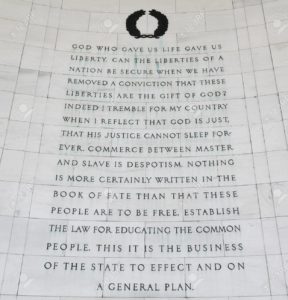 Years ago, visiting the Jefferson Memorial, I noticed these words inscribed on the wall – I am surprised that there hasn’t been more mention of them in our recent national conversation about racism and white supremacy He writes – way too mildly, we can all acknowledge, but with a startling honesty: “I tremble for my country when I reflect that God is just. That his justice cannot sleep forever. Commerce between master and slave is despotism. Nothing is more certainly written in the book of fate than that these people are to be free. . . “
Years ago, visiting the Jefferson Memorial, I noticed these words inscribed on the wall – I am surprised that there hasn’t been more mention of them in our recent national conversation about racism and white supremacy He writes – way too mildly, we can all acknowledge, but with a startling honesty: “I tremble for my country when I reflect that God is just. That his justice cannot sleep forever. Commerce between master and slave is despotism. Nothing is more certainly written in the book of fate than that these people are to be free. . . “
So: he knew. But though he knew he did not free, or advocate freedom, for his slaves. even acknowledging here that justice, and perhaps the arc of history, was against him. I think that is one of the things that is so hard for us white people about encountering our “whiteness” we are finding out about wrongs that, deep down, we always knew were wrong. Telling ourselves that this has to change: but not decisively taking next steps to make the change. But in this moment of honesty, Jefferson rightly sees the country – and himself -as being “under judgement” – and knowing ourselves to be under judgement is the necessary first step to repentance, change, and the courage to embrace truth reconciliation, and reparation, whatever that will look like. That is the work that begins again now, in 2020.
A poem I wrote 20 years ago is “talking back” to me in a fresh way as I reflect on these matters. I wrote it just after Inauguration Day 2001, when George W. Bush was sworn in. But the memory it depicts, which emerged on that day like a remembered trauma, goes back to 1981 and the ascendancy of Ronald Reagan. In the twenty years before that, I had seen some hope in the programs that emerged from the “War on Poverty” in the 1960s and 1970s – and indeed statistics we are reading today suggest that in some ways the wealth gap between white and black was just beginning to close, between new programs like Medicaid, the expansion of Food Stamps, Head Start, and other extensions of a social safety net, most of them still with us today, but in badly shredded form. Their deliberate dismantling begins in the late 1970s and 1980s and has continued. So what I was seeing in 1980, traveling from North Philadelphia to my apartment near the University of Pennsylvania, has turned out to be prophetic. The gaze I found myself facing corresponds now to the reality of systemic racism, looking back at me, and revealing a whiteness that is “under judgement.” There’s more to it that that I believe: I continue to wrestle with this image. But it came, and it’s in the poem, and poem is speaking louder than ever today.
JUDGMENT DAY
The nightmare returns: It is 1981,
Inauguration Day, and on the television screens
The Good Guys are in. “Today the world is bright,” they say.
Now we will be led by
People like us.”
In the glare of celebration, whole neighborhoods dissolve
Off the screen, invisible,
Disappeared.
Walking toward the subway, from where I have been teaching
Young adults who never learned to read in school,
With sudden clarity, I see
Boarded-up houses,
Dazed and aimless men standing on corners.
A grandmother holds a child by one hand,
Dragging a half-full grocery cart.
A broken church marquee proclaims: JOHN 3:16:
AND GOD SO LOVE. .. . .
Though I ride this subway line, under decaying streets,
And come home to this block of shabby walk-ups,
I could blend in with those bright rulers and their wives.
Our apartment here is newly renovated.
My face is white, my clothes are new.
I am a “young professional”
Desirable tenants, we are just passing through
The housekeeper has been here.
The walls seem whiter than I remembered,
Clean without my labor.
But on the gleaming window frame
A brown cockroach, the size of my thumb
Looks at me.
In this city, such creatures inhabit all our houses.
The rich use chemicals to remove them when they come.
The poor live with them, having no choice.
Reaching for the spray can, I forget for a moment
The colonies of his fellows
Who live within these walls, and under these streets,
And in my neighbors’ houses.
Looking back at him,
I decide
Because I can decide
To let him live.
(from Annunciations: Poems out Of Scripture)